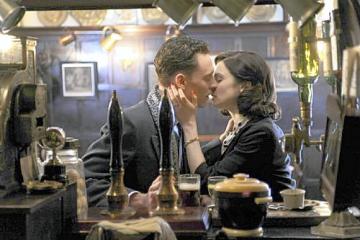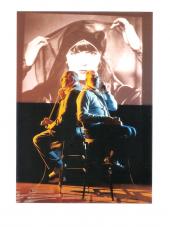'Deep Blue Sea' delves deep into the sadness of love's expiration date
The curtain rises on Hester's methodical preparations, to the exquisite strains of Samuel Barber's Violin Concerto: She closes the curtains in her dingy London flat, stuffs a towel under the door, puts a note on the mantelpiece, swallows some pills, inserts coins in the gas meter, turns on the valve, lies down and drifts off as it hisses....
There will be a rude awakening -- more than one, actually -- in this somber adaptation of Terence Rattigan's "The Deep Blue Sea," a play literally and figuratively dated to England's postwar doldrums of 1950. Its heroine is Hester (Rachel Weisz), attractive young wife of an older gentleman-judge, Sir William Collyer (Simon Russell Beale). The story plays out in sporadic flashbacks: One night in a raucous pub, she meets dashing Freddie (Tom Hiddleston), an RAF pilot still obsessed by the war.
Freddie is stuck in his heroics of the '40s. She's stuck in a sexless marriage, with her mother-in-law from hell (a fabulous monster, played by Barbara Jefford). They spar nastily at dinner. "I'm sure Hester didn't mean to be impolite," Sir William apologizes to mum.
We're sure she did.
In any case, William is stunned when she leaves their life of luxury to move in with fickle, faithless Freddie, who awakens her sexuality but can't give her the love or stability that William did -- and that she didn't want.
Like most of Rattigan's dramas ("The Winslow Boy," "The Browning Version") "The Deep Blue Sea" (previously filmed in 1955 with Vivien Leigh) is upper-middle-class based, full of understated and misunderstood emotions. He was more of an Annoyed than an Angry Young Man of his generation -- not my favorite playwright. But he gave us several wonderful screen adaptations of his plays, namely "Separate Tables" (1958), with David Niven's Oscar-winning performance, and the deliciously oddball "Prince and the Showgirl" (1957) starring that deliciously odd couple of Laurence Olivier and Marilyn Monroe. Plus the great-fun original script of "Yellow Rolls-Royce" (1964).
In the script at hand, both main characters are equally maddening -- but equally well-played. A-list leading lady Rachel Weisz (2005 Oscar winner for "The Constant Gardener") inhabits a difficult role with which it's hard to empathize: This incredibly needy, manipulative, self-obsessed woman puts Freddie's shoes on a table after he tells her that's bad luck. She hopelessly confuses lust with love. Her newfound ecstasy with him is not so new or ecstatic to him, but she's so sexually repressed, she can't see that or the sadomasochistic rhythm of his abusiveness and her forgiveness.
A-list Weisz's B-list leading man, Tom Hiddleston, was Loki in the Marvel comics movie "Thor" (which he'll be reprising next year in "Thor 2" -- I can hardly wait), and played Scott Fitzgerald in Woody Allen's "Midnight in Paris" last year. Mr. Beale is excellent as long-suffering hubby William.
Director-scriptwriter Terence Davies ("The Neon Bible," "The House of Mirth") has a beautiful but deadly slow and mirthless approach -- to Rattigan as well as Wharton. But his vision of the Blitz is terrifically evocative in one amazing dreamlike flashback: a slow-pan tableau of Londoners seeking refuge in the Aldwych Underground Station.
Most powerful, though, is the film's incredible first sequence, to Hillary Hahn's performance of Barber -- the most exquisite American violin concerto ever written -- culminating in a circular shot of the illicit lovers in a John-and-Yoko-style nude embrace. Hester licks Freddie's shoulder once -- just once -- at the very end of it.
This -- and all other music in the film -- is crucial to the storytelling, especially the great old sentimental, boozy bar songs like Jo Stafford's "You Belong to Me" -- a fine foolish notion, if ever there was one. There must be 50 ways to leave your lover, Paul Simon teaches us. None of them is very nice, but some are much crueler than others: After the rejection, the incredulity, the devastation, when does the "acceptance" come -- before, during or after the suicide attempt?
It is not exactly uplifting, and it's highly theatrical in structure as well as dialogue, but it is nuanced and believable -- the torment of a love/lust too overwhelming either to handle or suppress, the painful loneliness upon realizing the impermanence: Love is a can of delicious soup -- with an expiration date.
Everyone in "Deep Blue Sea" is shaped, damaged by or still living in the emotional wreckage of the war. When written (with shades of "Brief Encounter"), it was a metaphor for the disillusion, exhaustion and diminishment of postwar Britain. The metaphorical shoe fits post-war-on-terror America, as well.
The heart and the language of it are lovely. After Hester's suicide attempt, William breaks his boycott of her and shows up to ask if she still loves Freddie and if Freddie still loves her. "I thought my indifference would hurt your vanity," he says, now more regretful than enraged. "You betrayed my friendship and trust. If we'd had a child, would it have made any difference?" She replies: "To whom?"
"This is a tragedy," he concludes.
"Tragedy is too big a word," she corrects. "Sad, perhaps."






